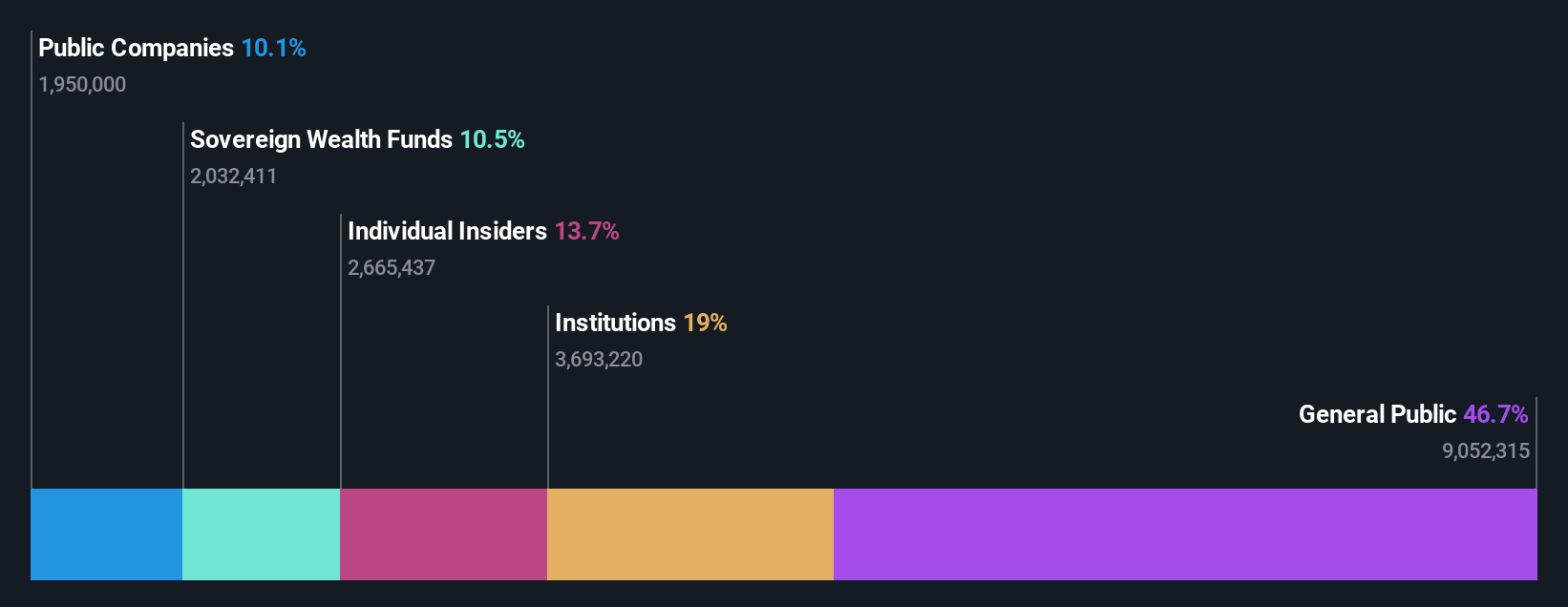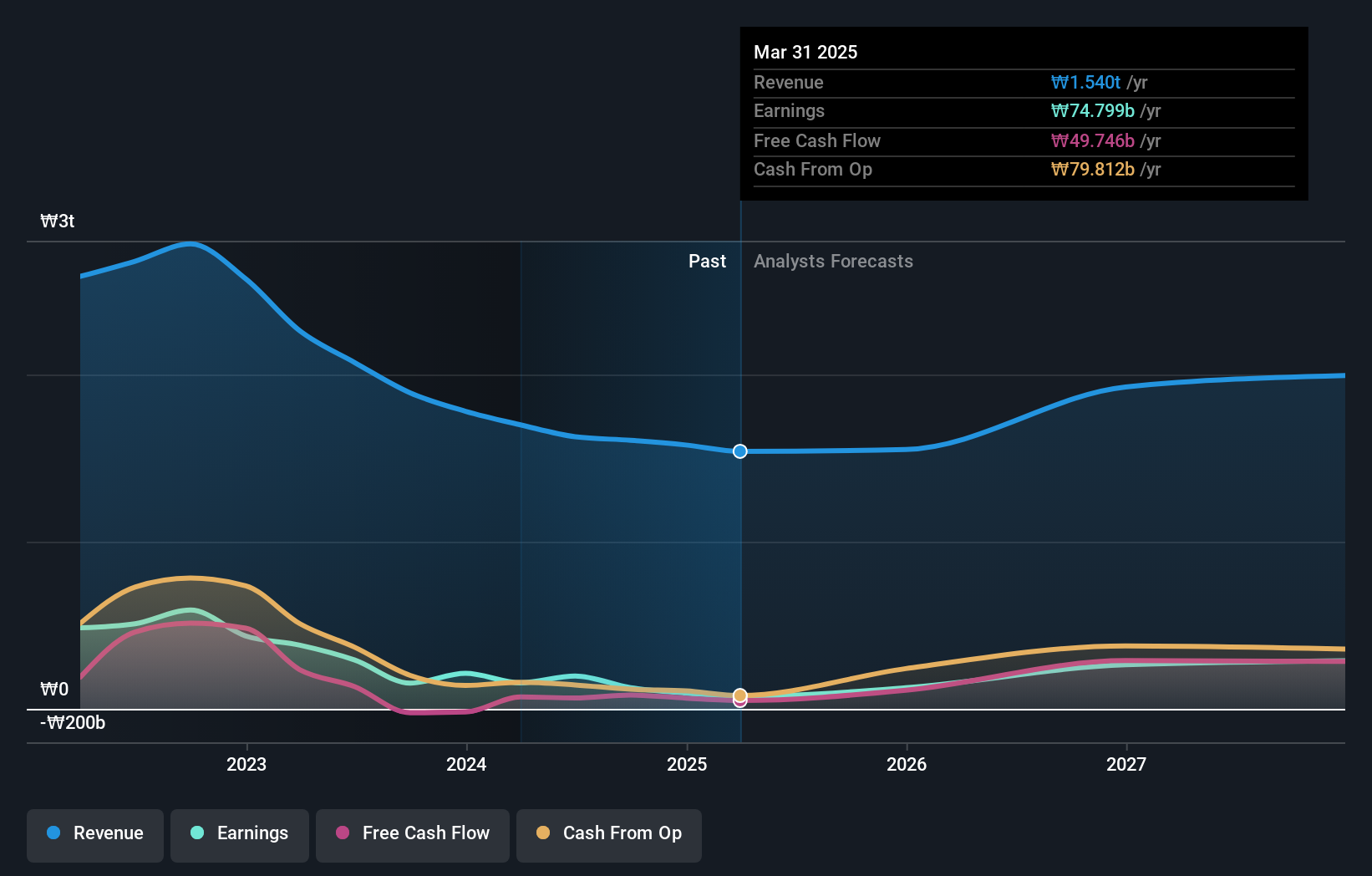- South Korea
- /
- Entertainment
- /
- KOSE:A036570
Painful week for retail investors invested in NCSOFT Corporation (KRX:036570) after 8.4% drop, institutions also suffered losses
Key Insights
- Significant control over NCSOFT by retail investors implies that the general public has more power to influence management and governance-related decisions
- A total of 13 investors have a majority stake in the company with 50% ownership
- Insiders own 14% of NCSOFT
A look at the shareholders of NCSOFT Corporation (KRX:036570) can tell us which group is most powerful. With 47% stake, retail investors possess the maximum shares in the company. Put another way, the group faces the maximum upside potential (or downside risk).
Following a 8.4% decrease in the stock price last week, retail investors suffered the most losses, but institutions who own 19% stock also took a hit.
Let's take a closer look to see what the different types of shareholders can tell us about NCSOFT.
See our latest analysis for NCSOFT

What Does The Institutional Ownership Tell Us About NCSOFT?
Institutions typically measure themselves against a benchmark when reporting to their own investors, so they often become more enthusiastic about a stock once it's included in a major index. We would expect most companies to have some institutions on the register, especially if they are growing.
NCSOFT already has institutions on the share registry. Indeed, they own a respectable stake in the company. This can indicate that the company has a certain degree of credibility in the investment community. However, it is best to be wary of relying on the supposed validation that comes with institutional investors. They too, get it wrong sometimes. If multiple institutions change their view on a stock at the same time, you could see the share price drop fast. It's therefore worth looking at NCSOFT's earnings history below. Of course, the future is what really matters.

Hedge funds don't have many shares in NCSOFT. The company's largest shareholder is Taek-Jin Kim, with ownership of 14%. For context, the second largest shareholder holds about 10% of the shares outstanding, followed by an ownership of 10% by the third-largest shareholder.
After doing some more digging, we found that the top 13 have the combined ownership of 50% in the company, suggesting that no single shareholder has significant control over the company.
While studying institutional ownership for a company can add value to your research, it is also a good practice to research analyst recommendations to get a deeper understand of a stock's expected performance. There are a reasonable number of analysts covering the stock, so it might be useful to find out their aggregate view on the future.
Insider Ownership Of NCSOFT
The definition of company insiders can be subjective and does vary between jurisdictions. Our data reflects individual insiders, capturing board members at the very least. Management ultimately answers to the board. However, it is not uncommon for managers to be executive board members, especially if they are a founder or the CEO.
Insider ownership is positive when it signals leadership are thinking like the true owners of the company. However, high insider ownership can also give immense power to a small group within the company. This can be negative in some circumstances.
It seems insiders own a significant proportion of NCSOFT Corporation. It is very interesting to see that insiders have a meaningful ₩517b stake in this ₩3.8t business. Most would be pleased to see the board is investing alongside them. You may wish to access this free chart showing recent trading by insiders.
General Public Ownership
With a 47% ownership, the general public, mostly comprising of individual investors, have some degree of sway over NCSOFT. This size of ownership, while considerable, may not be enough to change company policy if the decision is not in sync with other large shareholders.
Public Company Ownership
It appears to us that public companies own 10% of NCSOFT. This may be a strategic interest and the two companies may have related business interests. It could be that they have de-merged. This holding is probably worth investigating further.
Next Steps:
While it is well worth considering the different groups that own a company, there are other factors that are even more important. Be aware that NCSOFT is showing 2 warning signs in our investment analysis , you should know about...
Ultimately the future is most important. You can access this free report on analyst forecasts for the company.
NB: Figures in this article are calculated using data from the last twelve months, which refer to the 12-month period ending on the last date of the month the financial statement is dated. This may not be consistent with full year annual report figures.
Valuation is complex, but we're here to simplify it.
Discover if NCSOFT might be undervalued or overvalued with our detailed analysis, featuring fair value estimates, potential risks, dividends, insider trades, and its financial condition.
Access Free AnalysisHave feedback on this article? Concerned about the content? Get in touch with us directly. Alternatively, email editorial-team (at) simplywallst.com.
This article by Simply Wall St is general in nature. We provide commentary based on historical data and analyst forecasts only using an unbiased methodology and our articles are not intended to be financial advice. It does not constitute a recommendation to buy or sell any stock, and does not take account of your objectives, or your financial situation. We aim to bring you long-term focused analysis driven by fundamental data. Note that our analysis may not factor in the latest price-sensitive company announcements or qualitative material. Simply Wall St has no position in any stocks mentioned.
About KOSE:A036570
NCSOFT
Develops and publishes online games in Korea, Japan, Taiwan, the United States of America, Europe, and Canada.
Excellent balance sheet with reasonable growth potential.
Similar Companies
Market Insights
Community Narratives




